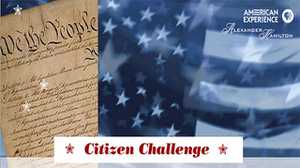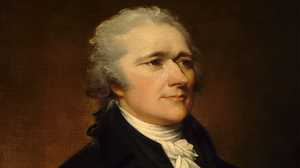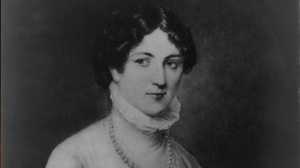Your Constitution I.Q.
In 1787, Alexander Hamilton launched a campaign to convince the newly united states to adopt a Constitution. Hamilton and a few colleagues passionately argued the cause in a series of essays known as The Federalist. The Constitution that resulted became the law of the land that our nation has relied on for more than 200 years to safeguard rights and define our government. The basics of what Hamilton explained and exhorted in The Federalist have become part of the national character.
How well do you know your government?
Take this quiz about the debate over the Constitution.
Two sets of questions: Easy and Hard.
Correct answer below at the end of the quesstions.
1. Governing Documents
[easy]
The Federalists supported a stronger central government than the one defined in earlier governing documents called:
a) The Letters of Intent
b) The Congressional Journals
c) The Rules of Engagement
d) The Articles of Confederation
Hamilton identified a weakness of the Articles of Confederation, "the concurrence of thirteen distinct sovereign wills is requisite, under the Confederation, to the complete execution of every important measure that proceeds from the Union." (Federalist No. 15)
[hard]
According to Alexander Hamilton, the Articles of Confederation failed to prevent America from reaching "almost the last stage of national humiliation." What was this humiliation?
a) No official capital city.
b) No organized defenses for the country.
c) A lack of respect from foreign governments.
d) A poorly designed national flag.
Hamilton wrote, "We borrowed money from foreigners and our own citizens at a time of imminent peril and now we cannot repay those debts." (Federalist No. 15)
2. Bill of Rights
[easy]
Hamilton argued the Constitution didn't need a bill of rights because unlike England the United States didn't have:
a) A monarchy.
b) A jolly roger.
c) A parliament.
d) A navy.
According to Hamilton, "Other constitutions may have bill of rights in order to defend the rights of people against the power of kings." (Federalist No. 84)
[hard]
Hamilton thought a bill of rights to the Constitution would be counterproductive because:
a) it would open the door to endless modifications to the Constitution
b) it implies that certain rights should not be assumed.
c) it would add more paperwork and red tape to the government.
d) it would require the Congress to reconvene during the hot summer months
Hamilton stated, "We are not giving up any rights, so we do not need a piece of paper to protect them." (Federalist No. 84)
3. Limiting Power
[easy]
One way of preventing any group or party attaining too much power in the government is to:
a) allot a fixed number of seats for each party in the government.
b) have a supreme ruler who will make sure no group has too much power.
c) structure the government into different independent branches.
d) ban all political parties.
Hamilton and the Federalists believed this offered more security than the alternate where, "In a single republic, all the power surrendered by the people is submitted to the administration of a single government." (Federalist No. 51)
[hard]
Hamilton and the Federalists proposed a divided government with three branches:
a) The Democratic branch, the Republican Branch and the Independent Branch.
b) The Judicial Branch, The Legislative Branch and the Prejudicial Branch.
c) The Presidency, Supreme Court and the Legislature
d) The Presidency, Legislature and Judiciary.
Hamilton's Federalist colleague James Madison stressed that these branches must be independent as "The accumulation of all powers, legislative, executive, and judiciary, in the same hands... may justly be pronounced the very definition of tyranny." (Federalist No. 47)
4. A Vast Nation
[easy]
Hamilton and the Federalists offered several reasons why the thirteen states should be united as one country. This was not one of them:
a) The states all shared the same ancestors
b) The states fought a common war together to establish independence.
c) The states share the same beliefs in religion and government
d) One is a luckier number than thirteen.
Hamilton's colleague John Jay wrote, "With equal pleasure I have as often taken notice that Providence has been pleased to give this one connected country to one united people..." (Federalist No. 2)
[hard]
While the scale of the United States was vast -- requiring weeks of travel between them --Hamilton's fellow Federalist John Jay observed the states were conveniently bound and connected together by these "highways:"
a) Paved roadways.
b) Rivers and other waterways.
c) Railroad lines.
d) Telegraph lines.
Jay looked to the nation's waterways as "highways for the easy communication of friendly aids, and the mutual transportation and exchange of their various commodities." (Federalist No. 2)
5. State Sovereignty
[easy]
Under the Constitution, the central government takes away the power of states to elect:
a) state senators
b) the president
c) House Representatives
d) None of the above
James Madison pointed out that "each of the principal branches of the federal government will owe its existence more or less to the favor of the State governments..." (Federalist No. 45)
[hard]
The Constitution restricts states from having their own:
a) government
b) currency
c) state bird
d) state capital
James Madison argued that this would simplify money matters in that "a right of coinage in the particular States could have no other effect than to multiply expensive mints and diversify the forms and weights of the circulating pieces." (Federalist No. 44)
6. Presidential Power
[easy]
According to the first ratified Constitution, the President is not able to:
a) be a bachelor
b) be charged with a crime
c) be elected for more than two terms
d) declare war
Hamilton wrote that the President's role as commander-in-chief "would amount to nothing more than the supreme command and direction of the military and naval forces... while that of the British king extends to the DECLARING of war." (Federalist No. 69)
[hard]
Under the Constitution, the President has the power to return a bill which has passed through two branches of the legislature and that bill would only become law if:
a) approved by two-thirds of both Houses.
b) the president changed his mind.
c) approved unanimously by both houses.
d) the bill was rewritten to the president's liking.
Hamilton wrote, "The President of the United States is to have power to return a bill, which shall have passed the two branches of the legislature, for reconsideration; and the bill so returned is to become a law, if, upon that reconsideration, it be approved by two thirds of both houses." (Federalist No. 69)
7. National Security
[easy]
To help resolve disputes with foreign powers, Hamilton argued for the establishment of a federal:
a) navy
b) diplomatic corps
c) bureau of interrogation
d) air force
According to Hamilton, a "resource for influencing the conduct of European nations toward us... would arise from the establishment of a federal navy." (Federalist No. 11)
[hard]
Hamilton and the Federalists argued that the nation's defense would be stronger if:
a) each state had its own army
b) the nation had three armies: a northern, central and southern division
c) if there was one national army
d) if defense was handled on a town-by-town basis, with an efficient local militia
Hamilton's colleague John Jay reasoned that a national army " can apply the resources and power of the whole to the defense of any particular part, and that more easily and expeditiously than State governments or separate confederacies can possibly do..." (Federalist No. 11)
8. Protecting Liberty
[easy]
Hamilton and the Federalists warned that popular governments often broken down into small warring groups known as:
a) infractions.
b) factions.
c) secret societies.
d) bands of brothers.
Hamilton affirmed, "A FIRM Union will be of the utmost moment to the peace and liberty of the States, as a barrier against domestic faction and insurrection." (Federalist No. 9)
[hard]
Hamilton and the Federalists argued that a central national government is better suited to address larger national issues, while these are more suited to handle local interests:
a) local churches.
b) state legislatures.
c) community centers.
d) county chairs.
James Madison described the central government's relationship to state government as "a happy combination... the great and aggregate interests being referred to the national, the local and particular to the State legislatures." (Federalist No. 10)
9. Federal Judges
Hamilton argued Federal judges should serve:
a) two four-year terms.
b) one six-year term.
c) for life.
d) until they are voted out by the people.
Hamilton wrote that "all judges who may be appointed by the United States are to hold their offices DURING GOOD BEHAVIOR..." (Federalist No. 78)
[hard]
Hamilton believed that independent federal judges were guardians of:
a) their pensions.
b) the Constitution.
c) the nation's courtrooms.
d) the liberty gavel.
Hamilton wrote that the "independence of the judges is equally requisite to guard the Constitution and the rights of individuals..." (Federalist No. 78)
10. Innovative Government
[easy]
Hamilton and the Federalists acknowledged that the innovative American government followed in the footsteps of the "leaders of the Revolution." To which Revolution did they refer?
a) The Industrial Revolution.
b) The French Revolution.
c) The Evolution Revolution.
d) The American Revolution.
James Madison praised the American Revolution leaders: "They accomplished a revolution which has no parallel in the annals of human society. They reared the fabrics of governments which have no model on the face of the globe." (Federalist No. 14)
[hard]
Hamilton and the Federalists characterized the innovative United States government as a great:
a) monstrosity.
b) mistake.
c) experiment.
d) bag of tricks.
James Madison asked of opponents to the Constitution, "why is the experiment of an extended republic to be rejected, merely because it may comprise what is new?" (Federalist No. 14)
Rankings based on # of correct answers.
10
Federalist Hall of Fame
You've got nothing on Hamilton and the Federalists!
7 - 9
Strong Central Intellect
You have a strong sense of what is right!
4-6
Constitutionally Capable
You know a thing or two about the Federalists.
1-3
Articles of Desperation
You struggled a bit with this. Try again!
0
Bill of Frights
Why don't you give it another go? You can't do any worse!
Answers:
1. Easy: D, Hard: C
2. Easy: A, Hard: B
3. Easy: C, Hard: D
4. Easy: D, Hard: B
5. easy: D, Hard: B
6. Easy: D, Hard: A
7. Easy: A, Hard: C
8. Easy: B, Hard: D
9. Easy: C, Hard: B
10: Easy: D, Hard: C







